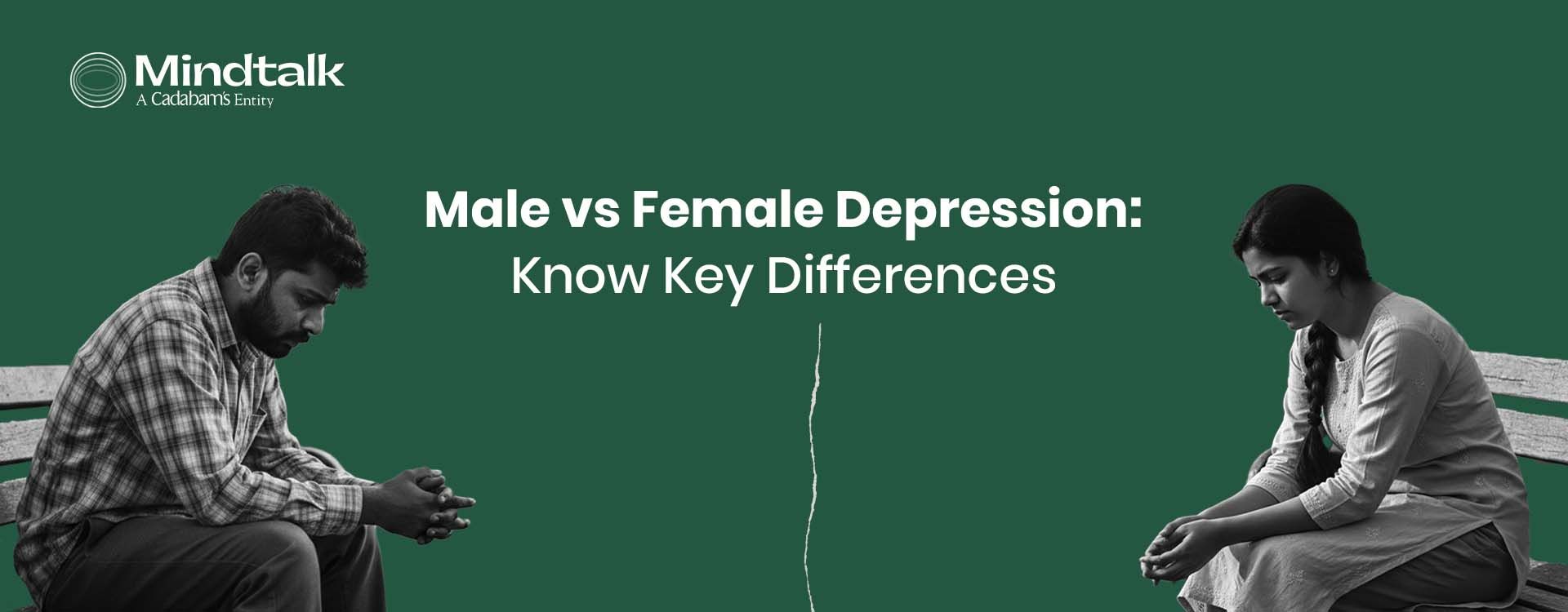Teenage Depression: Signs, Causes, And Support Tips
Is your teen struggling? Teen depression is more common than you might think, affecting millions each year and leaving families searching for solutions. Here, we'll explore how to create a supportive home environment, healthy lifestyle changes, and resources available to help your teen overcome teenage depression and build resilience for the future.

What Is Teenage Depression?
Teenage depression is a serious condition that goes far beyond feeling down for a few days. Often, depression in teenagers manifests as persistent feelings of sadness, hopelessness, and a loss of interest in activities that once brought joy. The consequences of this can be profound, affecting a teen's relationships, academic performance, and daily life as a whole.
Addressing mental health in teenagers is essential, as untreated depression can lead to long-term consequences. The good news is that with timely support, professional help, and a nurturing environment, depression in teenagers is treatable, offering hope for a brighter future.
Key Triggers For Teenage Depression
What might seem trivial to us might be enough to impact your teenager’s mental health severely and contribute to teenage depression. They’re going through a time of drastic change and may seem a lot more volatile. Here are some factors that can affect your teenager's mental wellbeing.
- Hormonal Changes: The rollercoaster of puberty can trigger mood swings and make teens more vulnerable to emotional challenges.
- Social Pressures: Navigating friendships, academics, and the pressure to fit in can be overwhelming for teens, leading to feelings of isolation and inadequacy.
- Family Issues: Experiencing conflict at home, a parent's divorce or the loss of a loved one can be a significant trigger for depression.
- Brain Chemistry: A family history of depression or imbalances in brain chemicals can increase a teen's susceptibility.
- Academic Struggles: Difficulty concentrating, failing grades, or feeling overwhelmed by schoolwork can contribute to feelings of hopelessness and low self-esteem.
- Bullying: Being bullied online or in person can be incredibly damaging to a teen's mental health, leading to depression and anxiety.
How Common Is Depression In Teenagers?
Depression is surprisingly common in teenagers, affecting millions each year. It's important to remember that boys and girls can experience teenage depression, although symptoms may present differently. If you're concerned about a teen showing signs of depression, early intervention is crucial. Getting them the help they need can make a significant difference in their emotional well-being and future.
Signs Of Depression In Teenagers
Teenagers with depression may experience a range of changes in mood, behavior, and physical health. These changes can be subtle or significant, so it's important to be aware of potential signs.
Lack Of Energy And Motivation
A teen with depression might constantly feel tired, even after sleeping a lot. They may lose interest in activities they used to enjoy, like sports, hobbies, or hanging out with friends. Even simple tasks can feel overwhelming, and they may lack the motivation to start or complete them.
Declining Academic Performance
Changes in schoolwork can be a red flag for depression in teenagers. This might include a drop in grades, difficulty concentrating in class, forgetting assignments, or skipping school altogether. They may lose interest in learning or feel overwhelmed by schoolwork.
Unexplained Aches And Pains
Teens with depression may frequently complain about physical problems like headaches, stomachaches, or muscle aches, even when there's no underlying medical cause. These aches and pains may be a way their body manifests emotional distress.
Difficulty Concentrating
Depression can significantly impact a teen's ability to focus. They may find it hard to concentrate on schoolwork, conversations, or even hobbies they used to enjoy. This can also lead to forgetfulness, difficulty making decisions, or feeling easily distracted.
Causes Of Depression In Teenagers
Depression in teenagers is a complex issue with no single cause. However, several factors can significantly contribute to its development. Here are some of the most common:
Hormonal Changes
Puberty is a time of immense physical and emotional change. Fluctuations in hormones like estrogen, testosterone, and serotonin can trigger mood swings, irritability, and increased vulnerability to emotional challenges. These hormonal shifts can leave teens feeling overwhelmed and struggling to cope, potentially leading to depression.
Social Media Influence
Social media platforms can be a breeding ground for negative comparisons and unrealistic portrayals of life. Constant exposure to filtered images and seemingly perfect lives can lead teens to feel inadequate and insecure about their own bodies, social standing, and achievements. This negativity can significantly impact self-esteem and contribute to feelings of hopelessness and depression.
Substance Abuse
Teens struggling with depression may turn to drugs or alcohol to self-medicate and numb difficult emotions. While they might offer a temporary sense of relief, substance abuse ultimately worsens depression. It can disrupt brain chemistry, create dependence, and lead to risky behaviors that further isolate teens and exacerbate their mental health problems.
Family Environment And Genetics
A chaotic or stressful home environment can be a major trigger for depression in teenagers. Experiencing constant conflict with parents, siblings, or caregivers can create feelings of anxiety, insecurity, and a lack of support. Additionally, if a parent or close family member suffers from depression or another mental illness, teens are at a higher risk of developing it themselves due to a combination of genetics and environmental factors. Parental guidance is of utmost importance in mitigating the risks of teenage depression.
The Crucial Role Of Parental Support In Teen Mental Health
A teenager's mental well-being thrives with open communication and a supportive home environment. Parents play a vital role in fostering this as parental guidance and increasing the teenager’s mental health awareness are crucial. Here's how they can make a significant difference:
Effective Ways To Talk To Your Teen About Depression
Having a conversation about depression with your teen can feel daunting, but it's an essential step towards understanding their mental health. By opening up and honestly communicating with your teen, you will create a safe and supportive environment for him or her. The following are some practical ways to approach these sensitive topics:
- Create a safe space: Find a calm, distraction-free environment where your teen feels comfortable expressing themselves openly.
- Ask open-ended questions: Instead of yes or no questions, use prompts like "How are things going?" or "Tell me more about what's been on your mind."
- Actively listen: Pay close attention to their words and body language, showing genuine interest without interruption.
- Validate their feelings: Acknowledge their emotions and let them know it's okay to feel sad, angry, or frustrated. Avoid judgmental statements.
- Offer support and resources: Let them know you're there for them and explore options together, like therapy or support groups.
Building A Supportive And Structured Home Environment
Creating a nurturing home environment is key to building your teen's confidence, resilience, and sense of belonging. Here are practical ways to establish a supportive and stable atmosphere for your family.
- Set clear expectations and boundaries: Provide a sense of structure and stability with consistent rules and consequences.
- Encourage healthy communication and conflict resolution: Teach them how to communicate their needs and resolve disagreements in a healthy way. Parental guidance and open communication is key.
- Celebrate their achievements and foster self-esteem: Acknowledge their accomplishments, big and small, to build confidence and self-worth.
- Prioritize family time and create positive routines: Schedule regular meals together, engage in shared activities, and establish healthy sleep and wake schedules to promote their mental health awareness, a sense of connection and well-being.
Teen Depression Treatment Options
Addressing teen depression requires a comprehensive approach tailored to individual needs. From therapeutic interventions to lifestyle adjustments, various treatment options are available to manage depression symptoms effectively and improve mental health in teenagers. Below are some of the most effective strategies for treating depression in teenagers.
Therapy Options
Therapy plays a vital role in treating teen depression, offering various approaches to support emotional well-being. Cognitive-behavioral therapy (CBT) helps teens recognise and alter negative thought patterns, while interpersonal therapy focuses on enhancing relationships and communication skills. Group therapy provides a supportive environment where teens can connect with peers and share experiences, fostering a sense of understanding and community.
Role Of Medication
In some cases, antidepressants may be prescribed to regulate brain chemistry and alleviate symptoms of depression in teenagers. When combined with therapy, medication can significantly contribute to improving the overall mental health of teenagers. Close monitoring by a healthcare professional ensures safety and effectiveness throughout the treatment process.
Lifestyle And Professional Care
Lifestyle changes, such as incorporating regular exercise, eating a balanced diet, and maintaining proper sleep schedules, are vital in supporting recovery. When combined with therapy or medication, these habits create a holistic approach to improving mental health in teenagers.
When To Seek Professional Help For Teen Depression
If symptoms of depression persist, worsen, or begin to interfere with your teen’s daily life despite initial efforts, seeking professional help is crucial. Consulting with a therapist, psychiatrist, or paediatrician ensures your teen receives a comprehensive evaluation and tailored care plan to address their specific needs. Professional intervention can provide strategies and treatments to effectively manage depression in teenagers, promoting recovery and long-term well-being.
Managing Teen Depression: Strategies And Tips
While depression is a serious condition, there are effective strategies and tips that can help teens manage their symptoms and feel better. Here are a few key areas to focus on:
Educate Yourself And Your Family On Mental Health
Understanding mental health conditions like depression and anxiety equips you with the tools to better support your teen. Use credible sources like government health websites or mental health organisations to gain accurate insights. Educating yourself not only enhances awareness but also encourages open discussions within the family, making it easier to recognise when professional help is needed.
Recognise The Signs Of Teen Depression
Recognising subtle changes in your teen’s mood, behaviour, or physical health is crucial. Look for warning signs such as withdrawal from activities, difficulty concentrating, persistent fatigue, or changes in appetite. Early identification of these signs allows for timely intervention, reducing the risk of long-term emotional and social challenges.
Encourage Open Communication
Create a safe space for open and honest communication. Let your teen know you're there to listen without judgment. Use "I" statements to express concern and ask open-ended questions like, "How are things going for you at school?" or "Can you tell me more about what's been bothering you?" This allows them to express their feelings freely.
Limit Screen Time
Excessive social media use can be detrimental to mental health. Studies have shown a correlation between increased screen time and symptoms of depression. Set healthy boundaries on phone and computer use, encouraging breaks throughout the day and creating screen-free zones like bedrooms or dinner tables.
Establish A Healthy Routine
Regularity and structure can be incredibly helpful in managing depression. Work with your teen to create a daily routine that includes consistent sleep schedules, balanced meals with plenty of fruits and vegetables, and planned activities. This routine provides a sense of stability and predictability, which can reduce stress and improve mood.
Promote Physical Activity
Exercise is a powerful tool for managing depression. Physical activity releases endorphins, natural mood-lifters that can help combat feelings of sadness and hopelessness. Encourage your teen to engage in activities they enjoy, whether it's team sports, individual workouts, or spending time outdoors. Even small increases in physical activity can make a significant difference.
Normalise Seeking Professional Help
Encourage therapy as a normal and positive step toward managing mental health challenges. Discuss the benefits of counselling openly and dispel misconceptions that seeking help is a weakness. By normalising professional support, you create a safe and accepting environment that motivates your teen to seek assistance when needed.
Encourage Healthy Coping Mechanisms
Help your teen explore healthy ways to manage stress, including activities like meditation, journaling, or engaging in physical exercise. These practices not only promote emotional resilience but also offer constructive outlets for processing their feelings. Encouraging family participation in these activities fosters stronger bonds and creates a nurturing environment, which is essential for improving mental health in teenagers and supporting their overall well-being.
Leveraging Mindtalk For A Brighter Future In Teen Mental Health
At Mindtalk, we understand the complexities of teen mental health. Our team of experienced specialists are dedicated to supporting teens struggling with teenage depression, anxiety, and other emotional challenges.
Mindtalk offers a range of therapy options, including one-on-one counselling, family therapy, and group sessions, designed to help teens build resilience and develop healthy coping mechanisms. For cases that require medical intervention, our psychiatrists provide expert evaluations and treatment plans, including medication management, ensuring a holistic approach to mental well-being.
If you're seeking solutions for emotional and mental well-being of your teenager, Mindtalk’s expert therapists are here to help. Our platform offers comprehensive mental health services, including counselling, therapy, and psychiatric care, provided by specialised experts. With a focus on evidence-based and holistic approaches, we support your path to personal growth and healing. Reach out to us today to book a therapy session. Call us at +91 73534 00999.




